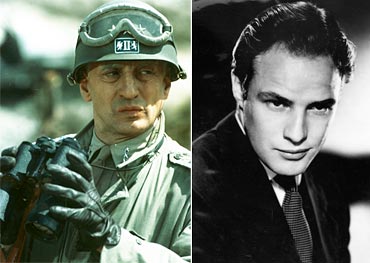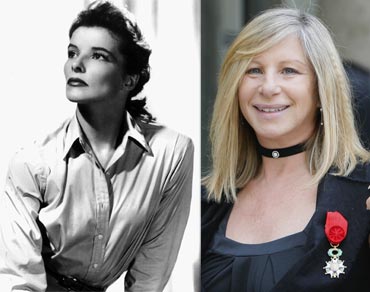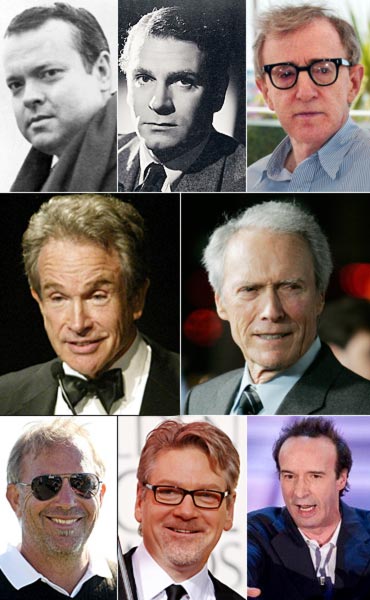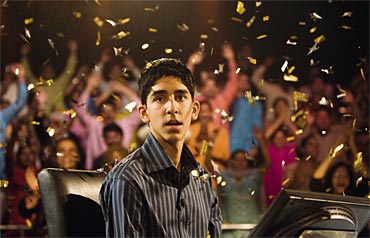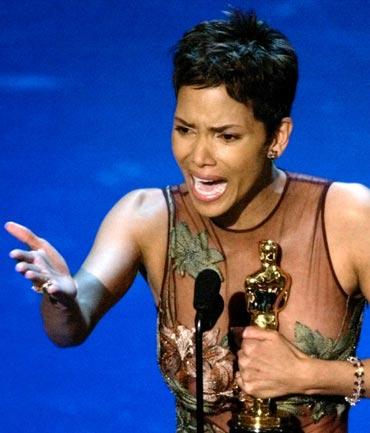 | « Back to article | Print this article |
Ready for today's Oscar Challenge?
1. George C Scott and Marlon Brando have both won Oscars for Best Actor. What distinct fact links these two actors?
a. Brando and Scott won for playing famous generals.
b. Both Brando and Scott declined the Oscar.
c. Brando and Scott won for playing the same part in different years.
The correct answer: Both Brando and Scott declined the Oscar.
Scott, who played General George S Patton, the legendary American military commander in World War II with unbelievable realism, refused to accept the prize when he won in 1970.
When Goldie Hawn declared 'Oh, my God, the winner is George C Scott!,' Entertainment Weekly recorded later that 'the honoree was asleep at his New York state farm with his then wife, actress Colleen Dewhurst, and sons -- thus becoming the first actor to reject the coveted award.'
Scott had informed the Academy that he would reject the nomination if it acknowledged his work in Patton, which incidentally had an Oscar-winning script by Francis Ford Coppola, who would win an Oscar for Best Director in 1974 for The Godfather II, and Edmund H North.
The temperamental Scott had done it before -- nine years earlier, in 1961, he had tried to reject his Best Supporting Actor nomination for The Hustler even though he didn't object when he received a Best Supporting Actor nod for Anatomy of a Murder in 1959.
Though Hollywood was divided over his gesture, Scott explained that he believed actors should not compete against each other, and hence his decision to decline the biggest prize for an actor.
As if it to indicate that it didn't hold that decision against Scott, the Academy nominated him the very next year for Best Actor for The Hospital. He didn't win: Gene Hackman won for The French Connection.
Two years later, Brando, who won for playing Don Vite Corleone in The Godfather, refused to accept the trophy. He sent an American Indian named Sacheen Littlefeather -- who appeared in Apache costume -- to the Oscars to cite his reasons. Brando said he didn't want the Oscar and wanted to protest against the way Hollywood and television portrayed American Indians, whose cause he had championed.
The Academy didn't hold it against Brando either, nominating him for Last Tango in Paris, the very next year. He didn't win that year or in 1989 when he was nominated for A Dry White Season. In all, Brando was nominated nine times and won twice -- his earlier win was for the memorable On the Waterfront in 1954.
Dudley Nichols, who won the Best Writing Oscar in 1935 for The Informer, did not attend the Oscar ceremony because of a squabble between the Academy and the Writer's Guild.
Scott, who played General George S Patton, the legendary American military commander in World War II with unbelievable realism, refused to accept the prize when he won in 1970.
When Goldie Hawn declared 'Oh, my God, the winner is George C Scott!,' Entertainment Weekly recorded later that 'the honoree was asleep at his New York state farm with his then wife, actress Colleen Dewhurst, and sons -- thus becoming the first actor to reject the coveted award.'
Scott had informed the Academy that he would reject the nomination if it acknowledged his work in Patton, which incidentally had an Oscar-winning script by Francis Ford Coppola, who would win an Oscar for Best Director in 1974 for The Godfather II, and Edmund H North.
The temperamental Scott had done it before -- nine years earlier, in 1961, he had tried to reject his Best Supporting Actor nomination for The Hustler even though he didn't object when he received a Best Supporting Actor nod for Anatomy of a Murder in 1959.
Though Hollywood was divided over his gesture, Scott explained that he believed actors should not compete against each other, and hence his decision to decline the biggest prize for an actor.
As if it to indicate that it didn't hold that decision against Scott, the Academy nominated him the very next year for Best Actor for The Hospital. He didn't win: Gene Hackman won for The French Connection.
Two years later, Brando, who won for playing Don Vite Corleone in The Godfather, refused to accept the trophy. He sent an American Indian named Sacheen Littlefeather -- who appeared in Apache costume -- to the Oscars to cite his reasons. Brando said he didn't want the Oscar and wanted to protest against the way Hollywood and television portrayed American Indians, whose cause he had championed.
The Academy didn't hold it against Brando either, nominating him for Last Tango in Paris, the very next year. He didn't win that year or in 1989 when he was nominated for A Dry White Season. In all, Brando was nominated nine times and won twice -- his earlier win was for the memorable On the Waterfront in 1954.
Dudley Nichols, who won the Best Writing Oscar in 1935 for The Informer, did not attend the Oscar ceremony because of a squabble between the Academy and the Writer's Guild.
Ready for today's Oscar Challenge?
a. Turn down the Oscar.
b. Win for playing the same role some years apart.
c. Win the Oscar jointly.
The correct answer: Win the Oscar jointly.
When the votes were tallied in 1968, it was discovered that Hepburn and Streisand had won exactly the same number for their performances in The Lion in Winter and Funny Girl respectively.
It was not the first tie in Oscar history -- in 1932, Fredric March (Dr Jekyll and Mr Hyde) and Wallace Beery (The Champion) had shared the Best Actor Oscar.
Nominated five times, actress-singer Streisand has won twice -- the other Oscar came in 1976 for Music (Original Song) -- Evergreen (A Star Is Born).
We have noted Hepburn's incredible triumphs in an Oscar quiz last week; please do check it out.
Meryl Streep has been nominated 16 times -- 13 nods for Best Actress; the other three for Best Supporting Actress. No other actor or actress even comes close.
Meryl was first nominated in 1978 for Deer Hunter; her most recent nomination came last year for Julia and Julia.
She has only won twice -- in 1979 for Kramer vs Kramer (Best Supporting Actress) and in 1984 for The French Lieutenant's Woman (Best Actress). Which means Hollywood's finest actress has not gone home with an Oscar for 27 years!
When the votes were tallied in 1968, it was discovered that Hepburn and Streisand had won exactly the same number for their performances in The Lion in Winter and Funny Girl respectively.
It was not the first tie in Oscar history -- in 1932, Fredric March (Dr Jekyll and Mr Hyde) and Wallace Beery (The Champion) had shared the Best Actor Oscar.
Nominated five times, actress-singer Streisand has won twice -- the other Oscar came in 1976 for Music (Original Song) -- Evergreen (A Star Is Born).
We have noted Hepburn's incredible triumphs in an Oscar quiz last week; please do check it out.
Meryl Streep has been nominated 16 times -- 13 nods for Best Actress; the other three for Best Supporting Actress. No other actor or actress even comes close.
Meryl was first nominated in 1978 for Deer Hunter; her most recent nomination came last year for Julia and Julia.
She has only won twice -- in 1979 for Kramer vs Kramer (Best Supporting Actress) and in 1984 for The French Lieutenant's Woman (Best Actress). Which means Hollywood's finest actress has not gone home with an Oscar for 27 years!
Ready for today's Oscar Challenge?
a. They have all been nominated for Best Actor and Best Director for the same film.
b. They have all never been nominated for Best Actor.
c. They have all never been nominated for Best Director.
The correct answer: They have all been nominated for Best Actor and Best Director for the same film.
Welles for Citizen Kane; Olivier for Hamlet; Allen for Annie Hall; Beatty twice (Heaven Can Wait and Reds); Eastwood also twice (Unforgiven, Million Dollar Baby); Costner (Dance with Wolves); Branagh (Henry V); Benigni (Life is Beautiful).
None of them won both awards though Allen, Beatty (Reds), Costner, Eastwood (for both films) won Best Director, and Olivier (the only actor to win playing a Shakespearean character) and Benigni won Best Actor.
Beatty and Branagh didn't win the year Heaven Can Wait and Henry V were nominated. Welles was fobbed off with the Best Screenplay Oscar, which he shared with Herman J Mankiewicz.
Welles, perhaps Hollywood's most original talent ever, was awarded an honourary Oscar in 1970, to make up for the many years the Academy' had ignored his craft.
The Coen brothers -- Ethan and Joel -- are the only bros to be nominated (seven times in different categories; they have won four trophies, including once for Best Director for No Country for Old Men).
Francis Ford Coppola and his only daughter Sofia are the only pa and daughter to be nominated for Best Director. The father thrice, for all three Godfather films; Sofia for Lost in Translation.
Francis Ford won Best Director only once (Godfather II; it also won him the Best Picture and Best Screenplay Oscars).
His work on the first Godfather epic lost out to Bob Fosse's Cabaret (he won Best Screenplay Oscar though). His first Oscar, as we told you in the answer to the first question in this quiz, came for Best Screenplay for Patton.
Sofia's Lost in Translation lost to Peter Jackson for the final part of J R R Tolkien's trilogy: The Lord of the Rings: The Return of the King. Like her pa, she took home the Best Screenplay Oscar that night.
Carmine Coppola, Francis Ford's father, won an Oscar for Best Score for Godfather II; he was also nominated for Best Song for the final part of his son's great Mafia epic.
Finally, only two directors have received the Best Director trophy in consecutive years -- John Ford for The Grapes of Wrath (1940) and How Green Was My Valley (1941), and Joseph L Mankiewicz for A Letter to Three Wives (1949) and All About Eve (1950).
Welles for Citizen Kane; Olivier for Hamlet; Allen for Annie Hall; Beatty twice (Heaven Can Wait and Reds); Eastwood also twice (Unforgiven, Million Dollar Baby); Costner (Dance with Wolves); Branagh (Henry V); Benigni (Life is Beautiful).
None of them won both awards though Allen, Beatty (Reds), Costner, Eastwood (for both films) won Best Director, and Olivier (the only actor to win playing a Shakespearean character) and Benigni won Best Actor.
Beatty and Branagh didn't win the year Heaven Can Wait and Henry V were nominated. Welles was fobbed off with the Best Screenplay Oscar, which he shared with Herman J Mankiewicz.
Welles, perhaps Hollywood's most original talent ever, was awarded an honourary Oscar in 1970, to make up for the many years the Academy' had ignored his craft.
The Coen brothers -- Ethan and Joel -- are the only bros to be nominated (seven times in different categories; they have won four trophies, including once for Best Director for No Country for Old Men).
Francis Ford Coppola and his only daughter Sofia are the only pa and daughter to be nominated for Best Director. The father thrice, for all three Godfather films; Sofia for Lost in Translation.
Francis Ford won Best Director only once (Godfather II; it also won him the Best Picture and Best Screenplay Oscars).
His work on the first Godfather epic lost out to Bob Fosse's Cabaret (he won Best Screenplay Oscar though). His first Oscar, as we told you in the answer to the first question in this quiz, came for Best Screenplay for Patton.
Sofia's Lost in Translation lost to Peter Jackson for the final part of J R R Tolkien's trilogy: The Lord of the Rings: The Return of the King. Like her pa, she took home the Best Screenplay Oscar that night.
Carmine Coppola, Francis Ford's father, won an Oscar for Best Score for Godfather II; he was also nominated for Best Song for the final part of his son's great Mafia epic.
Finally, only two directors have received the Best Director trophy in consecutive years -- John Ford for The Grapes of Wrath (1940) and How Green Was My Valley (1941), and Joseph L Mankiewicz for A Letter to Three Wives (1949) and All About Eve (1950).
Ready for today's Oscar Challenge?
a. They were all produced by the same studio.
b. Their directors had never won a Best Director Oscar earlier.
c. They all won the Best Picture Oscar.
The correct answer: They all won the Best Picture Oscar.
The second option could also have been correct, but for the fact that one of those ten directors -- Million Dollar Baby's Eastwood -- had won an Oscar before (Unforgiven) for Best Director.
The other directors at the helm of these Best Picture winners were:
Ridley Scott who didn't win the Best Director prize for Gladiator;
Ron Howard won his first best Director Oscar for A Beautiful Mind;
Rob Marshall didn't win the Best Director prize for Chicago;
Peter Jackson won his first Best Director Oscar for The Lord of the Rings: The Return of the King;
Paul Haggis didn't win the Best Director prize for Crash;
Martin Scorsese won his first Best Director Oscar for The Departed;
Ethan and Joel Coen won their first Best Director Oscar for No Country for Old Men;
Danny Boyle won his first Best Director Oscar for Slumdog Millionaire;
Kathyrn Bigelow won her first Best Director Oscar for The Hurt Locker, the first lady winner in the category.
The second option could also have been correct, but for the fact that one of those ten directors -- Million Dollar Baby's Eastwood -- had won an Oscar before (Unforgiven) for Best Director.
The other directors at the helm of these Best Picture winners were:
Ridley Scott who didn't win the Best Director prize for Gladiator;
Ron Howard won his first best Director Oscar for A Beautiful Mind;
Rob Marshall didn't win the Best Director prize for Chicago;
Peter Jackson won his first Best Director Oscar for The Lord of the Rings: The Return of the King;
Paul Haggis didn't win the Best Director prize for Crash;
Martin Scorsese won his first Best Director Oscar for The Departed;
Ethan and Joel Coen won their first Best Director Oscar for No Country for Old Men;
Danny Boyle won his first Best Director Oscar for Slumdog Millionaire;
Kathyrn Bigelow won her first Best Director Oscar for The Hurt Locker, the first lady winner in the category.
Ready for today's Oscar Challenge?
a. 60 seconds.
b. 55 seconds.
c. 45 seconds.
The correct answer: 45 seconds
Winners can give a 45 second speech on stage, and one backstage to a 'thank you cam,' where they can thank everyone they want, for as long as they want to.
The backstage video will be posted on the Internet.
Oscar co-producer Bill Mechanic said the 45 second limit for speeches on stage would eliminate what he called 'the single most hated thing on the show.'
If that time limit was in place in 2002, Hollywood -- indeed the planet -- would have been robbed of what is widely believed to be the most moving acceptance speech in a long time.
Halle Berry, the first and only black woman to win a Best Actress Oscar (Monster's Ball), had this to say: "Oh my God. I'm sorry. This moment is so much bigger than me.
"This moment is for Dorothy Dandridge, Lena Horne, Diahann Carroll. It's for the women that stand beside me -- Jada Pinkett, Angela Bassett and it's for every nameless, faceless woman of colour that now has a chance because this door tonight has been opened.
"Thank you. I'm so honoured. I am so honoured and thank the academy for choosing me to be the vessel from which this blessing might flow. Thank you.
"I want to thank my manager, Vincent Cirrincione. He's been with me for 12 long years and you've fought every fought and you've loved me when I've been up. But more importantly you've loved me when I've been down.
"You have been a manager, a friend and the only father I've ever known and I love you very much.
"I want to thank my Mom who's given me the strength to fight every single day to be who I want to be and given me the courage to dream that this dream might be happening and possible for me. I love you Mom so much.
"Thank you my husband who is just the joy of my life. And India -- thank you for giving me peace because only with the peace that you've brought me have I been allowed to go to places that I never even knew I can go. Thank you, I love you and India all my heart.
"I want to thank Lion's Gate. Thank you. Mike Pasternak, Tom Ortenberg for making sure everybody knew about this little tiny movie. Thank you for believing in me.
"Our director Marc Forster -- you're a genius -- you're a genius. This movie-making experience was magical for me because of you. You believed in me, you trusted me and you gently guided me to very scary places. Thank you.
"I want to thank Yvonna Chubick. I could have never figured out who the heck this lady was without you. I love you. Thank you.
"I want to thank Lee Daniels, our producer. Thank you for giving me this chance -- for believing that I could do it and now tonight I have this. Thank you.
"I want to thank my agents CAA, Josh Lieberman especially. I have to thank my agents, Kevin Huvane -- thank you, thank you for never kicking me out and sending me somewhere else -- thank you.
"I -- who else -- I have so many people that I know I need to thank um... my lawyers Neil Meyer. Thank you -- OK wait a minute -- I gotta take this -- 74 years here -- OK I've gotta take this time.
"I gotta thank my lawyer Neil Myer for making this deal -- Doug Stone.
I need to thank, lastly but not leastly I have to thank Spike Lee for putting me in my very first film and believing in me.
"Oprah Winfrey for being the best role model any girl can have. Jo Silver -- thank you and thank you to Warren Beatty. Thank you so much for being my mentors and believing in me. Thank you, thank you, thank you."
Winners can give a 45 second speech on stage, and one backstage to a 'thank you cam,' where they can thank everyone they want, for as long as they want to.
The backstage video will be posted on the Internet.
Oscar co-producer Bill Mechanic said the 45 second limit for speeches on stage would eliminate what he called 'the single most hated thing on the show.'
If that time limit was in place in 2002, Hollywood -- indeed the planet -- would have been robbed of what is widely believed to be the most moving acceptance speech in a long time.
Halle Berry, the first and only black woman to win a Best Actress Oscar (Monster's Ball), had this to say: "Oh my God. I'm sorry. This moment is so much bigger than me.
"This moment is for Dorothy Dandridge, Lena Horne, Diahann Carroll. It's for the women that stand beside me -- Jada Pinkett, Angela Bassett and it's for every nameless, faceless woman of colour that now has a chance because this door tonight has been opened.
"Thank you. I'm so honoured. I am so honoured and thank the academy for choosing me to be the vessel from which this blessing might flow. Thank you.
"I want to thank my manager, Vincent Cirrincione. He's been with me for 12 long years and you've fought every fought and you've loved me when I've been up. But more importantly you've loved me when I've been down.
"You have been a manager, a friend and the only father I've ever known and I love you very much.
"I want to thank my Mom who's given me the strength to fight every single day to be who I want to be and given me the courage to dream that this dream might be happening and possible for me. I love you Mom so much.
"Thank you my husband who is just the joy of my life. And India -- thank you for giving me peace because only with the peace that you've brought me have I been allowed to go to places that I never even knew I can go. Thank you, I love you and India all my heart.
"I want to thank Lion's Gate. Thank you. Mike Pasternak, Tom Ortenberg for making sure everybody knew about this little tiny movie. Thank you for believing in me.
"Our director Marc Forster -- you're a genius -- you're a genius. This movie-making experience was magical for me because of you. You believed in me, you trusted me and you gently guided me to very scary places. Thank you.
"I want to thank Yvonna Chubick. I could have never figured out who the heck this lady was without you. I love you. Thank you.
"I want to thank Lee Daniels, our producer. Thank you for giving me this chance -- for believing that I could do it and now tonight I have this. Thank you.
"I want to thank my agents CAA, Josh Lieberman especially. I have to thank my agents, Kevin Huvane -- thank you, thank you for never kicking me out and sending me somewhere else -- thank you.
"I -- who else -- I have so many people that I know I need to thank um... my lawyers Neil Meyer. Thank you -- OK wait a minute -- I gotta take this -- 74 years here -- OK I've gotta take this time.
"I gotta thank my lawyer Neil Myer for making this deal -- Doug Stone.
I need to thank, lastly but not leastly I have to thank Spike Lee for putting me in my very first film and believing in me.
"Oprah Winfrey for being the best role model any girl can have. Jo Silver -- thank you and thank you to Warren Beatty. Thank you so much for being my mentors and believing in me. Thank you, thank you, thank you."
